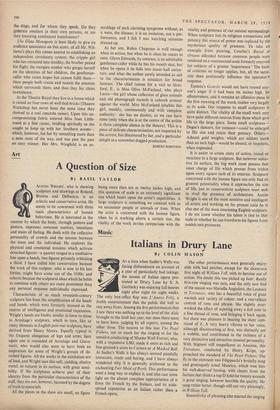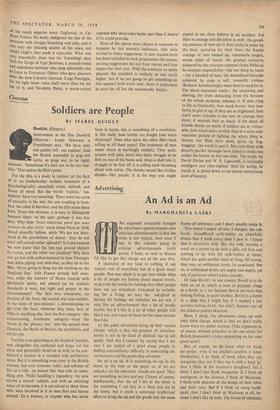Mu sic
Italians in Drury Lane
By COLIN MASON Ar a time when Sadler's Wells was facing disbandment on account of a year of particularly bad takings, the season of Italian opera pro- moted at Drury Lane by S. A. Gorlinsky was enjoying full houses night after night for eight weeks. The only box-office flop was L'Amico Fritz, a feeble entertainment that the public did well to stay away from. Among the five performances that I saw there was nothing up to the level of the Aida brought to the Stoll last year, nor does there seem to have been, judging by all reports, among the other three. The nearest to this was The Pearl Fishers, not so much for the singing as for the sensitive conducting of Manno Wolf-Ferrari, who, with a responsive LSO, made it seem as rich and fine-grained a score as Carmen or A Masked Ball. At Sadler's Wells it has always seemed painfully immature, crude and boring, and I have always wondered why it is generally preferred to the enchanting Fair Maid of Perth. This performance went a long way to explain it, and also cast some light on the almost complete appropriation of it from the French by the Italians, and its wide- spread reputation as an Italian rather than• a French opera. The other performances were generally enjoy- able with bad patches, except for the disastrous first night of William Tell, with its heroine out of action. No doubt this too picked up later. -Really first-rate singing was rare, and the only new find of the season was Mariella Angioletti, the Leonoa in Trovatore, who has a beautiful voice of great warmth and variety of colour, and a marvellous control of tone and phrase. She slightly over- worked the effect of tapering away a full note to a fine thread of tone, and bringing it back again, but there was pleasure in hearing the sheer com- mand of it. A very heavy vibrato to her voice, although disconcerting at first, was distinctly not a wobble, and contributed to the richness of a very distinctive and attractive musical personality. With Stignani still magnificent as Azucena, this Trovatore, conducted by Henry Krips, ap- proached the standard of The Pearl Fishers. The fly in the ointment was Filippeschi's brdtally sung and grotesquely acted Manrico, which won him his well-deserved booing, with cheers from the faction that thinks a top D held for twenty seconds is great singing, however horrible the quality. He sang rather better, though still not very pleasingly, in William Tell.
Insensitivity of phrasing also marred the singing of the much superior tenor Tagliavini, in The Pearl Fishers. He badly disfigured the line of the serenade with choppy breathing and sobs, and it Was only the pleasing quality of his voice, not unlike Gigli's, that made it enjoyable. What was very beautifully done was his 'friendship' duet With the Zurga of Ugo Savarese, a smooth-toned and melodious baritone who sang splendidly also as Luna in Trovatore. Others who gave pleasure Were the bass Lorenzo Gaetani, Luigi Pontiggia, for his light tenor voice itself more than for his use of it, and Nicoletta Panni, a warm-voiced soprano who deserved a better part than L'Amico Fritz could provide.
Most of the operas were chosen in response to requests by last season's audiences, who were invited to make suggestions. A new request-form has been included in each programme this season; inviting suggestions for any four operas and four singers for next year. With the audience so easily pleased, the standard is unlikely to rise much higher, but if we are going to get something on this season's level every year, there is enjoyment in store for all but the unmusically finicky.











































 Previous page
Previous page